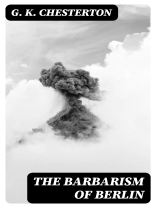In ‘The Barbarism of Berlin, ‘ G. K. Chesterton critiques the cultural and moral ramifications of the burgeoning modernity in early 20th-century Europe, particularly focusing on the ascendance of German nationalism and militarism. Through a blend of incisive satire and eloquent prose, Chesterton juxtaposes the civilizational achievements of Western culture with the barbaric tendencies he perceives in the political ideologies of his time. The book serves not only as a series of essays but also as a gripping commentary on the philosophical and ethical implications of war, invoking themes of loyalty, identity, and the soul of a nation in Crisis. Chesterton’s distinctive literary style engages readers through wit and paradox, making complex ideas accessible while inviting deep reflection on moral integrity in times of turmoil. G. K. Chesterton (1874-1936) was a prolific English writer, philosopher, and journalist who cultivated a reputation for his provocative ideas and formidable intellect. His keen insights into society, religion, and human nature stem from a diverse background in literature and a lifelong confrontation with modernism, often opposing prevailing ideologies. This book emerged from his passionate defense of the values of civilization amidst the looming threat of World War I, positioning him as a defender of Christian and traditional values during an era of upheaval. ‘The Barbarism of Berlin’ is an essential read for those seeking to understand the philosophical undercurrents of pre-War Europe and the cultural discourse that underpinned it. Chesterton’s engaging narrative style and thought-provoking arguments make this work not only a historical artifact but also a timeless reflection on human values in the face of barbarism. This book invites readers to reflect on the moral quandaries of their own times and challenges them to consider what it truly means to be civilized.
عن المؤلف
G.K. Chesterton (1874–1936), a prolific English writer, critic, and notable literary figure, employed his sharp wit and a distinctive style of apologetics through both fiction and non-fiction works. With an oeuvre spanning various genres, he is best known for his Christian apologetics, most notably in ‘Orthodoxy’ (1908) and ‘The Everlasting Man’ (1925), as well as his series of detective stories featuring the character Father Brown. His critique of contemporaneous socio-political systems is apparent in works like ‘The Barbarism of Berlin’ (1914), where he addresses the perils of militarism and nationalism in the context of pre-WWI Germany. Chesterton’s influence extends beyond literature into the realms of theology, philosophy, and the arts. Notably, his writings often embraced paradox and humor, contrasting the trends of Modernist literature. As an articulate defender of tradition and a challenger of modernist relativism, Chesterton’s legacy endures in the rich complexity and enduring relevance of his texts. His contributions to literature and public discourse were acknowledged by his contemporaries, and his thought continues to be studied and appreciated today.












